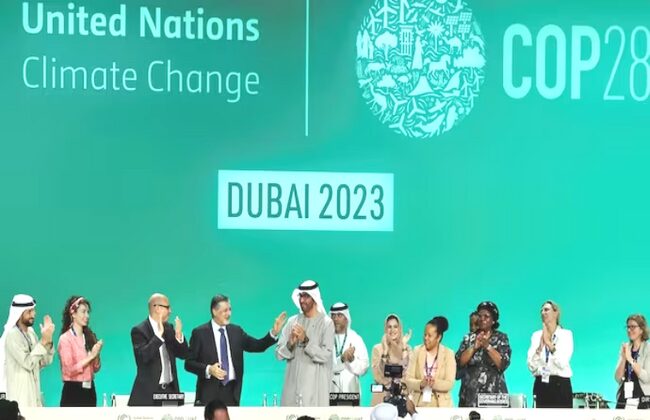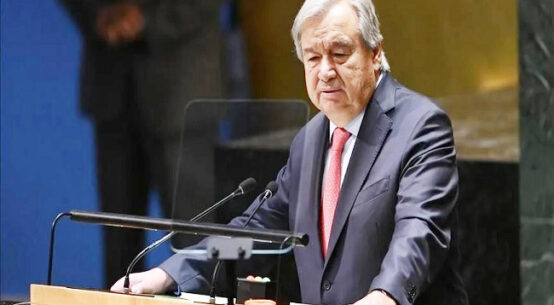
It was an extraordinary COP Summit in a year characterized by record-breaking temperatures combined with El Niño, producing a climatic carnage in Africa—deaths from fatal floods in the Democratic Republic of the Congo, Kenya, and Libya, where floods wiped out a quarter of a city.
Deadly cyclones in Malawi, Madagascar, Mauritius, Mozambique, and Zimbabwe; a severe drought in Kenya, Niger, Somalia, Ethiopia, Mauritania, and Djibouti; and a months-long winter heatwave in southern African countries—the need for COP28 to deliver the highest ambition on all items.
In the end, a deal that will secure the transition away from fossil fuels was accepted.
The United Nations Secretary General, António Guterres, welcomed the deal.
“To those who opposed a clear reference to a phase-out of fossil fuels in the COP28 text, I want to say that a fossil fuel phase-out is inevitable, whether they like it or not. Let’s hope it doesn’t come too late.”
COP28 president Sultan Ahmed Al Jaber said, “Let me sound a word of caution. Any agreement is only as good as its implementation. We are what we do, not what we say. We must turn this agreement into tangible action. If we unite, we can have a profound effect on all of our futures. Inclusivity kept us going in the difficult days. Everyone has been heard, from Indigenous peoples or youth to global south. “
The final stretch of COP28 was dedicated to the most contentious item: fossil fuel, to phase out or cut back. More than 100 countries have pledged to phase out fossil fuels that contribute to global warming.
Fossil fuels—coal, oil, and gas—account for over 75 percent of global greenhouse gas emissions and nearly 90 percent of all carbon dioxide emissions, pushing Africa’s poor and vulnerable to the brink of survival. The Paris Agreement’s global goal of keeping global warming to no more than 1.5°C served as the COP28’s compass. To cut greenhouse gas emissions to as close to zero as possible by 2050, emissions must decrease by 45 percent by 2030 and reach net zero.
“While this is the first time in the history of COPs that a goal to reduce fossil fuels formed part of the final deal, it is not ambitious enough and will not get us to net zero. We will need a bigger global adaptation fund and a larger Loss and Damage Fund,” Amos Kaggwa, a Ugandan-based climate activist, told IPS.
Kaggwa says the planet could reach global average temperatures of up to 3°C, “and there will be even more severe losses and damages from climate-related disasters. Africa’s climate-adaptive capacities will also be seriously compromised. Today, high-polluting rich countries are reluctant to pay for loss and damage and to provide sufficient funds for the least polluting poor countries to adapt to climate change.”
Thus far, 130 countries have agreed to triple renewable energy capacity and double energy efficiency by 2030. A total of 2,456 fossil fuel industry lobbyists participated at COP28, up from 636 last year, according to the Big Polluters Out coalition.
Africa emits an estimated 3.8 percent of global greenhouse gas emissions, but only two percent of the proportion of renewable energy investment went to the continent in 2023.
Mary Robinson, Chair of The Elders and former President of Ireland, commented:
“The Cop28 agreement, while signalling the need to bring about the end of the fossil fuel era, falls short by failing to commit to a full fossil fuel phase out. If 1.5C is our ‘North Star’, and science is our compass, we must swiftly phase out all fossil fuels to chart a course towards a liveable future. World leaders must continue to urgently pull together and find ways forward to tackle this existential threat. Every day of delay condemns millions to an uninhabitable world.”
Bavon Christopher, ActionAid Tanzania Country Director, spoke of the landmark delivery of the Loss and Damage Fund at COP28: “On the first day at COP28, we were very pleased with the pledges and thought the money would keep coming. We have USD 700 of the USD 400 billion per year needed to pay for losses and damages. The pledges are far from enough—not even enough for one African country. For instance, a few days ago, floods and landslides killed 60 people in Tanzania, injured more than 100, and destroyed at least 100 homes, not to mention livelihoods.”
Experts such as Kaggwa say the COP28 Global Goal on Adaptation did not build on the previous goal, stressing that it is weak and unlikely to deliver adaptive capacities and resilience and to reduce vulnerability to climate change in developing countries battered by climate-induced disasters.
“The Global Goal on Adaptation’s weakness is the glaring lack of mention of existing finance gaps. Current financing for adaptation does not match the needs on the ground. Even if we double the adaptation financing outlined in COP26, the needs on the ground will still be five to 10 times greater than the COP28 adaptation fund package. That is how wide the adaptation financing gap is,” he emphasizes.
Christopher wades into a conversation that has dominated climate talks among developing nations—climate financing and debt: “An estimated 85 percent of countries in the global South are in debt distress and are unlikely to spend funds on climate solutions due to competing needs. To repay the debts, they are likely to invest in extracting fossil fuels, further exacerbating the climate crisis. Africa should be given grants, not loans or debt swaps. On loss and damage, we expect no bureaucracy, as is often the case with multilateral financial institutions; funds for climate damages should flow to affected countries smoothly and with speed.”
Fadhel Kaboub, a Tunisian economist based in Nairobi and a senior advisor with Power Shift Africa and also the President of the Global Institute for Sustainable Prosperity, says “climate finance requires a minimum of USD 2.4 trillion of transformative grant-based investment and transfer of technology for climate adaptation and mitigation by 2030. We are nowhere near that target at the end of COP28. The historical polluters of the Global North owe a climate debt to the nations of the Global South, who are most affected by climate change. The Global North is in default and is refusing to pay its debt.”
Kaboub, also an Associate Professor of Economics at Denison University, says, “If you owe me USD 100, you are supposed to pay me. Instead, you give me a USD 10 loan with conditionalities to control how I use my money. You give me another USD 10 in exchange for having control over my forests and carbon markets. You invest another USD 10 in green electricity that I must export to you on favorable terms. You outsource another USD 10 worth of low-value-added manufacturing to produce cheap consumer goods for you. None of this should count as climate finance. It is a climate debt default greenwashed with neocolonial debt traps.”
Azerbaijan, a nation that receives 60 percent of its government budget from oil and gas and 90 percent of its export revenue, will host the following COP Summit. Oil and gas also supply 98 percent of Azerbaijan’s primary energy and at least 90 percent of the country’s electricity and are largely responsible for improved living standards over the last three decades. It will be the third time in a row that an oil and gas producer will be hosting a COP Summit.
Joyce Chimbi is a journalist who focuses on climate change, gender and health. She has written for the Association of Media Women in Kenya, Gender Links, Standard Newspaper, Nation Newspaper and Kenya Times. She works for the African Woman & Child Feature Service.


